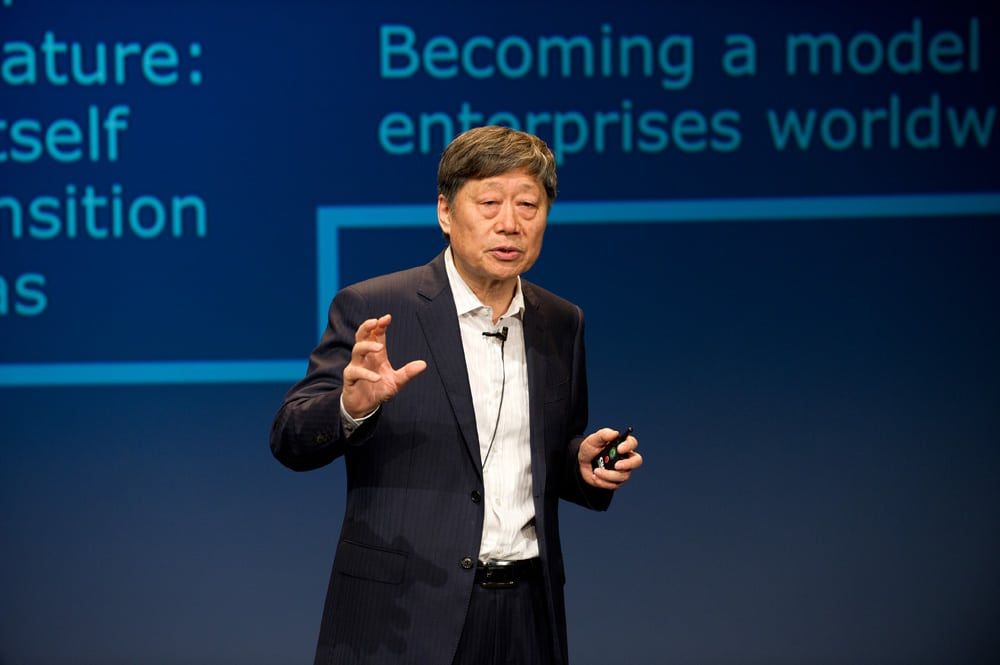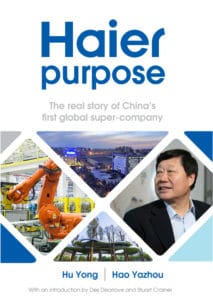
Hu Yong: Kevin Kelly said that being ‘out of control’ needs to be top down. We can use an analogy here: for modern companies on the unstable seas of today, if the captain doesn’t have enough control, the boat faces the risk of capsizing. I would like to know what you think about the relationships between the non-controlled and more decentralized organizations and the senior leaders in a modern enterprise.
Zhang Ruimin: Haier has now become a number of boats. I think having one ship is very dangerous.
I don’t think I am the helmsman or captain of a ship. I am a ship designer. I must be alert enough about the external situation and be able to transform or redesign the ship whenever needed. Maybe I would design one ship, or perhaps I would have to split it into many smaller boats.
Right now, it seems that I have designed many small boats, and I am just one of the flagships at most, or one of the leading vessels of the flotilla, or one that is simply pointing out directions for other boats. In fact, everyone can exert their own efforts to move forward in the same direction. Here comes the diversification again: every boat may take its own route, but all the routes will direct to one destination, serving the same purpose.
Hu Yong: Haier used to have the structure of a ship, but now has been converted into numerous boats. The risk of such a conversion could be very great. Have you ever thought about the chances of success?
Zhang Ruimin: There is no positive answer to this, really no positive answer, because this is too difficult. In terms of the degree of the subversion taking place at Haier, I am so lucky that the results are mostly as expected. I would like to challenge the common law that it is impossible for the same person to succeed in two different periods of time. I want to see whether I can accomplish something in both.
Hu Yong: What would you call these two different periods of time?
Zhang Ruimin: They are the Internet era of today and the traditional economy in the past.
Hu Yong: Have you considered what you will do if you are not successful? If you fail in your attempts?
Zhang Ruimin: I don’t think it could be a complete failure. There may be relatively more twists and turns, but after all, there will be some seeds of success left, as I have said, the sparks of success. How big the sparks are would determine the way we fan them into a bigger fire.
Hu Yong: So, the ideal situation would be that a spark starts a fire. Would that be considered a success?
Zhang Ruimin: No. In fact, it is always in a chaotic state, which would simply tend to be in some order sometimes. In this chaotic world, being able to maximize the negative entropy at one time is enough. In the year when the Dow Jones index celebrated its centenary, only one company that had been listed in 1896 remained to participate in the celebrations, which was GE. One hundred years of ebb and flow.
Hu Yong: Yes, including some famous enterprises mentioned in the book In Search of Excellence written by Tom Peters and Robert Waterman and even the book Built to Last by Collins. You can see, a few years later, many of these companies are finished. Digital Equipment Corporation, Motorola, and so on.
 Zhang Ruimin: They were legends of their time, but they did not stand for long. That is just the way how people think; there is no way to change it; after all, we are human beings. How fast does the external world change? Yet people still assume that it is constant, and will not change. How could it be?
Zhang Ruimin: They were legends of their time, but they did not stand for long. That is just the way how people think; there is no way to change it; after all, we are human beings. How fast does the external world change? Yet people still assume that it is constant, and will not change. How could it be?
For the question you asked me just now, I have not thought much about it. I’m just an explorer. I never think about what the final consequences will be. I do not worry about whether we will succeed in the future or not. If any problem arises, just solve it, and then proceed further.
This is an edited extract from Haier Purpose by Hu Yong and Hao Yazhou now available from Thinkers50 and Infinite ideas.

Thinkers50 Limited
The Studio
Highfield Lane
Wargrave RG10 8PZ
United Kingdom

Thinkers50 Limited
The Studio
Highfield Lane
Wargrave RG10 8PZ
United Kingdom

Thinkers50 Limited
The Studio
Highfield Lane
Wargrave RG10 8PZ
United Kingdom
| Cookie | Duration | Description |
|---|---|---|
| LANG | 9 hours | Linkedin set this cookie to set user's preferred language. |
| nsid | session | This cookie is set by the provider PayPal to enable the PayPal payment service in the website. |
| sp_landing | 1 day | The sp_landing is set by Spotify to implement audio content from Spotify on the website and also registers information on user interaction related to the audio content. |
| sp_t | 1 year | The sp_t cookie is set by Spotify to implement audio content from Spotify on the website and also registers information on user interaction related to the audio content. |
| tsrce | 3 days | PayPal sets this cookie to enable the PayPal payment service in the website. |
| x-pp-s | session | PayPal sets this cookie to process payments on the site. |
| __cf_bm | 30 minutes | This cookie, set by Cloudflare, is used to support Cloudflare Bot Management. |
| Cookie | Duration | Description |
|---|---|---|
| l7_az | 30 minutes | This cookie is necessary for the PayPal login-function on the website. |
| Cookie | Duration | Description |
|---|---|---|
| CONSENT | 2 years | YouTube sets this cookie via embedded youtube-videos and registers anonymous statistical data. |
| _ga | 2 years | The _ga cookie, installed by Google Analytics, calculates visitor, session and campaign data and also keeps track of site usage for the site's analytics report. The cookie stores information anonymously and assigns a randomly generated number to recognize unique visitors. |
| _gat_gtag_UA_10408481_1 | 1 minute | Set by Google to distinguish users. |
| _ga_ZP8HQ8RZXS | 2 years | This cookie is installed by Google Analytics. |
| _gid | 1 day | Installed by Google Analytics, _gid cookie stores information on how visitors use a website, while also creating an analytics report of the website's performance. Some of the data that are collected include the number of visitors, their source, and the pages they visit anonymously. |
| Cookie | Duration | Description |
|---|---|---|
| NID | 6 months | NID cookie, set by Google, is used for advertising purposes; to limit the number of times the user sees an ad, to mute unwanted ads, and to measure the effectiveness of ads. |
| test_cookie | 15 minutes | The test_cookie is set by doubleclick.net and is used to determine if the user's browser supports cookies. |
| VISITOR_INFO1_LIVE | 5 months 27 days | A cookie set by YouTube to measure bandwidth that determines whether the user gets the new or old player interface. |
| YSC | session | YSC cookie is set by Youtube and is used to track the views of embedded videos on Youtube pages. |
| yt-remote-connected-devices | never | YouTube sets this cookie to store the video preferences of the user using embedded YouTube video. |
| yt-remote-device-id | never | YouTube sets this cookie to store the video preferences of the user using embedded YouTube video. |
| yt.innertube::nextId | never | This cookie, set by YouTube, registers a unique ID to store data on what videos from YouTube the user has seen. |
| yt.innertube::requests | never | This cookie, set by YouTube, registers a unique ID to store data on what videos from YouTube the user has seen. |
| Cookie | Duration | Description |
|---|---|---|
| DEVICE_INFO | 5 months 27 days | No description |
| loglevel | never | No description available. |
| m | 2 years | No description available. |
Thinkers50 Limited has updated its Privacy Policy on 28 March 2024 with several amendments and additions to the previous version, to fully incorporate to the text information required by current applicable date protection regulation. Processing of the personal data of Thinkers50’s customers, potential customers and other stakeholders has not been changed essentially, but the texts have been clarified and amended to give more detailed information of the processing activities.